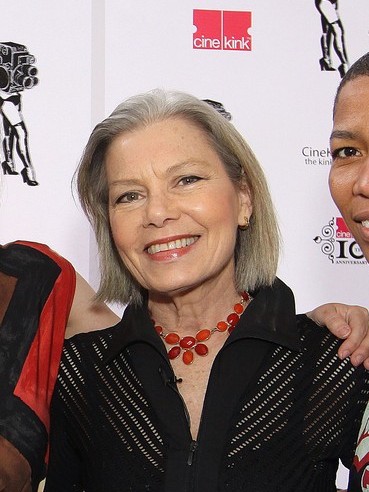
Candida Royalle was born in 1950 to a New York City that, to her, appeared buttoned-up and fucked-up about sex. She left that city, and the world, for good just a few days ago after several years of wrangling with ovarian cancer.
Following in her musician father’s footsteps, Royalle pursued an arts education, funded first by art modeling. The art modeling, in a career path familiar to many sex workers, quickly evolved into nude modeling and eventually into performance in about 25 feature length porn films. “I got into adult movies to support my art habit,” she explained in an August 2014 interview.
After a stop-and-start filmography, punctuated by periods of uncertainty and guilt, she left performing altogether in the hope of making a better pornography for us all by founding her own company, Femme Productions. Her first few years of film-making were particularly interesting, featuring older models; a wide range of body types; severe, “unsexy” shooting techniques; and weird, dystopian plots. Her film Revelations (1993) features a married couple living in a fascist, sex-hating future. The wife finds an old stash of dirty home movies which sexually transform her and ultimately result in her arrest. Royalle spoke frequently about wanting to create pornography that focused on feminine pleasure, and which made space for erotic storytelling that was not clichéd and shallow. Her goal was to create films that women would watch and that partners would watch together.
Over the past few decades, her production company became more successful and branched out into a wide array of sex toys, books, and even a biographical documentary which was in production before Royalle passed away. She was a heartening role model for women who could no longer directly sell their own sexual labor (by choice or necessity), but for whom leaving the industry altogether was not an option.
In an interview with Shannon Bell in the early nineties (which can be found in the anthology Whore Carnival, purchasable from any local radical independent bookstore which hasn’t purged all material discussing sex work as work yet), she describes the impact that working in front of the camera had on her sexuality:
What I realized was that what pornography taught me was how to mechanically have sex, perform sex. It actually was just a continuation in a way of what I felt the so-called “sexual revolution” did to women. Now you were allowed to say yes, but you weren’t allowed to say no. In the seventies, if you didn’t want to have sex with someone right away you were…uptight… (p.21)
These might seem like surprising words from someone who is best known for everything that happened after her 1980 retirement from performance, a production-side pioneer in the market of (straight) couple-oriented porn, and one of the big, pioneering names in the sex positivity movement. But a closer look at Royalle’s career makes the statement above make sense.

When sex workers today get together to talk about how we might make our lives safer and better, “sex positive” is one of those phrases that usually gets a bunch of well-deserved eye rolls, focused narrowly as that ideology is on the freedom of sexual expression denied to (some) women, as these (white, middle and upper class, cis) women are held forcibly to a restrictive model of sexual purity and denial of sexual pleasure. Which doesn’t have a whole lot to do with why sex workers trade sex, or why it’s important that we be able to do so unimpeded.
If you look at Royalle’s website, it’s easy to find a lot of the same predictable argot that radical feminists are so happy to take down as falsely conscious and ignorant of the realities of the exploited majority of sex workers—she waxes rhapsodic on the subject of feminist porn, of “sex films” that aren’t porn at all, of egalitarianism and the education of desire. All the stuff that makes for great “bring something home to the wife” sales and really lousy political discourse.
That said, as is the case for most of us who do sex work and also talk about sex work, marketing doesn’t match the reality of Royalle’s more private words—sex work as something that is neither inherently empowering nor inherently exploitative does not make for good ad copy. Royalle was one of the founding members of Club 90, an early peer support group for women who performed in porn, and, as she grew older, she directed the business of her production company towards nurturing and promoting young women directors. Her production teams hearkened back to her own experiences as an actress and prioritized the fair treatment and payment of performers, even as the AVN awards were just getting off the ground, and saw the fight against censorship as being first and foremost a fight against “sleazy underground crap, where the conditions for the performers are going to get worse and worse” (Whore Carnival, p. 29). While the vast majority of her work was heterocentric, she saw her porn and the defense of porn in general as a necessary part of the fight for LGBT expression, noting that the first pornography to be censored would always be the gay and lesbian material, leaving us as a society with “really stupid het schlock,” (Whore Carnival, p. 28).
She spoke forthrightly and unwaveringly on the necessity of decriminalization for her full service colleagues, particularly on the shocking failure of feminists who criticized her work as exploitative to speak out about what appeared to her to be an obvious human rights issue, specifically that she found it horrifying that “feminists don’t fight for decriminalization, doing something that would help women who work as prostitutes” (Whore Carnival, p. 24).
While there is much to criticize about what the persona Candida Royalle espoused, I believe that it is equally important to compare that to the work of Royalle the person, separate from the hype she used to sell her products to non-sex workers. I wouldn’t want anyone to dig up my professional website and draw too many conclusions from it about my politics, sexual foibles, or taste in shoes, and I’m not sure how much stock I’d place in the un-pornified-porn schtick of Femme Productions. What Candida Royalle did was to allow her performers to work safely, with someone who knew firsthand what they were experiencing—and she began that work at a time when more and more production companies were being slapped with crushing obscenity charges. While our demands for decent treatment as sex workers have grown more sophisticated since Femme Productions’ inception, her work is undoubtedly one of the bricks on which we stand.
Maggie Gyllenhaal is has done a GREAT job on season one of “The Deuce” (loosely) portraying Candida Royalle. It’s Terrible all the things her character goes through, but, at least, she’s off the Street and making movies.